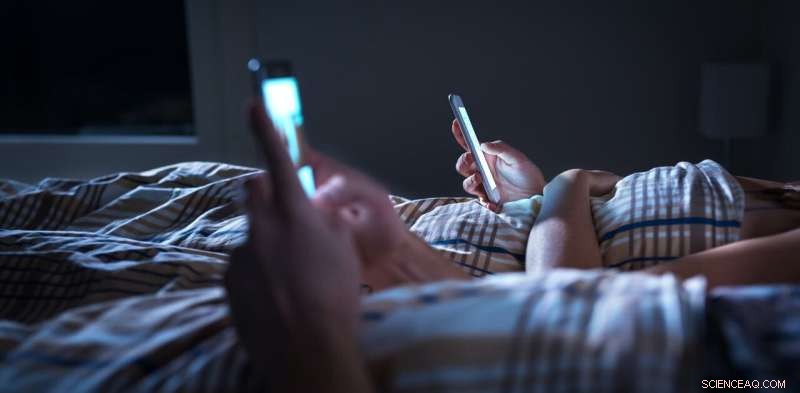
Wetenschap
Wil je je sociale media verwijderen, maar kom je er niet toe? Hier zijn enkele manieren om die stap te zetten

Tegoed:Shutterstock
Al meer dan een decennium zijn we diep ondergedompeld in een liefdesaffaire met sociale media. En de gedachte om dingen te beëindigen kan pijnlijk zijn. Maar zoals elke relatie, als sociale media je niet langer gelukkig maken - en als het samenstellen van je online persona vermoeiend is in plaats van leuk - is het misschien tijd om afscheid te nemen.
Eind vorig jaar werd Meta (voorheen Facebook) intensief onderzocht nadat uit gelekte documenten bleek dat het bedrijf zich volledig bewust was van de negatieve impact die zijn producten, met name Instagram, kunnen hebben op de geestelijke gezondheid van gebruikers.
Meta ging direct naar de schadebeperking. Maar het leek erop dat niemand bijzonder verrast was door het nieuws - zelfs geen tienermeisjes, die volgens Meta het meeste risico liepen. Bevestigde het lek alleen maar wat we al vermoedden:dat sociale media het potentieel hebben om veel meer schadelijk dan nuttig te zijn?
Hoe is onze ooit zorgeloze relatie met sociale media verzuurd? En misschien wel het belangrijkste, kan (of moet) het worden geborgen?
De rode vlaggen spotten
Relatietherapeuten vragen stellen met problemen vaak om na te denken over wat hen gelukkig maakte in hun relatie. Sociale media, al zijn het vervelende peccadillo's, hebben wel enkele verlossende functies.
Gedurende de pandemie is het vermogen om verbonden te blijven met mensen die we niet persoonlijk kunnen zien, ongelooflijk waardevol geworden. Sociale media kunnen mensen ook helpen hun stam te vinden, vooral als de mensen in hun offline wereld hun waarden en overtuigingen niet delen.
Maar als je geen dag kunt gaan zonder de sites te doorzoeken en je gedwongen voelt om "leuk" te vinden of "geliefd" te worden, dan zit je relatie in de problemen.
Hoewel verre van geregeld, richt het grootste deel van het onderzoek naar schermtijd zich op de nadelige effecten van overmatig of problematisch schermgebruik op het welzijn en de geestelijke gezondheid. Een meta-analyse uit 2021 van 55 onderzoeken, met een gecombineerde steekproefomvang van 80.533 mensen, vond een positief (zij het klein) verband tussen depressieve symptomen en het gebruik van sociale media.
Een belangrijke bevinding was dat de kans groter was dat negatieve gevolgen voortkwamen uit hoe het gebruik van sociale media de deelnemers zich voelde , rather than how long they used it.
Information overload
In trying to understand why social media can leave us feeling less than content, we can't look past the effect of the 24/7 news (and fake news) stream on our collective psyche.
A 2021 Deloitte survey of Australians found 79% thought fake news was a problem, and only 18% felt information obtained via social media was trustworthy. Having to navigate content that deliberately aims to perpetuate fear and dissent only adds to people's cognitive and emotional burden.
But here's the rub. It seems while we're generally concerned about technology having a negative impact on our well-being, this doesn't translate to behavior change on an individual level.
My own research published last year found more than two-thirds of survey participants believed excessive smartphone use can negatively impact well-being, yet individual usage was still very high, averaging 184 minutes per day. There was no relationship between the belief and the behavior.
What leads to this apparent cognitive-behavioral dissonance? The results of a long-term study by University of Amsterdam researchers might provide a clue. They found living in a "permanently online" world leads to decreased self-control over social media use and, subsequently, lower well-being.
In other words, we know what we're doing might be bad for us, but we do it anyway.
Simple steps you can take
How do you know when it's time to reevaluate your relationship with social media? There's one deceptively simple question to ask yourself:how does it make you feel?
Think about how you feel before, during and after you use social media. If you feel like you're wasting large chunks of your day, your week (or, dare I say, your life) on social media—that's a clue. If you feel negative emotions such as sadness, anxiety, guilt or fear, you have your answer.
But if divorcing social media abruptly feels like a step too far, what else can you do to slowly break away, or potentially salvage the relationship?
1. Start with a trial separation
A "soft delete" lets you see how you'll feel without your social media before committing to a hard delete. Let friends and family know you're taking a break, remove the apps from your devices, and set yourself a goal of maybe one or two weeks where you don't access the account/s. If the world is still turning at the end of this trial, keep going! Once you no longer feel the pull of social media, you'll be ready to hit delete.
2. Reduce the number of platforms you engage with
If you have Facebook, Instagram, Twitter, TikTok, YouTube, Snapchat, WhatsApp, Tumblr, Pinterest and Reddit on your phone, tablet and computer, you're probably past saturation point and into drowning territory. Pick one or two apps that genuinely serve a meaningful purpose for you, and ditch the rest. Gen X'ers find it hard to say goodbye to Facebook, but Gen Z have largely bid it farewell. If they can do it, so can you!
3. If steps 1 and 2 are still too much, try to reduce your time spent on social media
First and foremost, turn off all your notifications (yes, all of them). If you're conditioned to respond to every "bing," you'll find it almost impossible to stop. Set aside some time each day and do all your social media catching up or browsing. Set an alarm for your predetermined time allocation, and when it sounds, put the phone down until the same time tomorrow.
None of this will be easy, and walking away from social media might hurt at first. But if the relationship has become uncomfortable, or even abusive, it's time to take a stand. And who knows what untold happiness you might find, beyond the four walls of your screen?
 Wetenschappers onthullen mechanisme van dizuurstofactivering
Wetenschappers onthullen mechanisme van dizuurstofactivering Elektronisch afval verpulveren is groen, schoon en koud
Elektronisch afval verpulveren is groen, schoon en koud Onderzoek vindt ernstige problemen met forensische software
Onderzoek vindt ernstige problemen met forensische software Zetmeel kan normaal plastic in voedselverpakkingen vervangen
Zetmeel kan normaal plastic in voedselverpakkingen vervangen Checkpointblokkade door een D-peptide voor kankerimmunotherapie
Checkpointblokkade door een D-peptide voor kankerimmunotherapie
 Experimenten helpen onderscheid te maken tussen kernproeven en natuurlijke gebeurtenissen
Experimenten helpen onderscheid te maken tussen kernproeven en natuurlijke gebeurtenissen Gegevens van mobiele telefoons gebruiken om de blootstelling aan luchtvervuiling te schatten
Gegevens van mobiele telefoons gebruiken om de blootstelling aan luchtvervuiling te schatten Vampire Bat Life Cycle
Vampire Bat Life Cycle  Planten van de tropische savanne
Planten van de tropische savanne  Tokio slaat goud, zilver en brons met e-waste Olympische medailles
Tokio slaat goud, zilver en brons met e-waste Olympische medailles
Hoofdlijnen
- Hoe zijn ggo's gemaakt?
- Een natte winter kan de invasieve soorten van San Francisco Bay opschudden
- Dodelijke vispathogeen gedetecteerd in Australië
- Hoe nemen we beslissingen?
- Dode walvis verrast zwemmers op iconisch strand van Rio
- Elke zandkorrel is een metropool voor bacteriën
- Waarom is UV-licht schadelijk?
- De spieren van het menselijk lichaam onthouden
- Links of rechts? Net als mensen, bijen hebben een voorkeur
- Hoe de plesiosaurussen konden zwemmen met alleen vinnen

- Opmerkelijke brief onthult aardbevingsdrama voor nonnen in ballingschap

- De impact van klimaatbeleid en natuurrampen op bedrijven in China

- Onderzoekers leggen de eerste genetische geschiedenis van Rome uit

- De oudste menselijke begrafenis in Afrika ontdekt

 Vernieuwde EPA-website toont verhoogde risico's op klimaatverandering
Vernieuwde EPA-website toont verhoogde risico's op klimaatverandering Orkanen voorkomen met luchtbellen
Orkanen voorkomen met luchtbellen Mutanten in microzwaartekracht
Mutanten in microzwaartekracht Wat is het verschil tussen vijgen en pruimen?
Wat is het verschil tussen vijgen en pruimen?  NASA-NOAA-satelliet ziet systeem 91Ls elk in de westelijke golf van Mexico
NASA-NOAA-satelliet ziet systeem 91Ls elk in de westelijke golf van Mexico Dit is waarom bingewatchen niet meer in de mode is
Dit is waarom bingewatchen niet meer in de mode is High-speed 3D-printer voor hoogwaardige kunststoffen
High-speed 3D-printer voor hoogwaardige kunststoffen Hoe komt een protoloog aan voedsel?
Hoe komt een protoloog aan voedsel?
- Elektronica
- Biologie
- Zonsverduistering
- Wiskunde
- French | Italian | Spanish | Portuguese | Swedish | German | Dutch | Danish | Norway |

-
Wetenschap © https://nl.scienceaq.com

